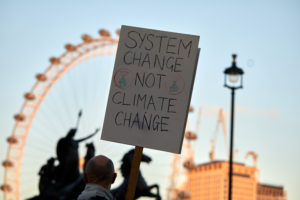Since the 1970’s, populations of mammals, birds, fish, reptiles, and amphibians have declined by nearly 60% according to a new report by the World Wildlife Fund.
The wildlife that remains may be looking at a similar fate, as the forces behind global warming, pollution, ocean acidification, habitat loss, overpopulation, and deforestation continue to threaten what is left.
The current rate of extinction that is occurring is estimated to be anywhere between 100 to 1,000 times higher than the rate of extinction before human pressures became a factor. The primary cause here is an absolute explosion in human consumption and the growing need for energy, land, and water.
Ironically, the modern lifestyle that billions of humans around the world live today relies on the same natural world that is currently being destroyed. More than ever, research is suggesting just how absolutely critical a healthy and thriving natural world is to our own health, food, and security.
There is no question that human activity has had an unprecedented effect on nature. As we progress through the 21st century, our planet finds itself at a crossroads with the decision of which path it takes next left solely up to us.
The nature conservation agenda is not only about securing the future of tigers, pandas, whales and all the amazing diversity of life we love and cherish on Earth. It’s bigger than that. Our day-to-day life, health and livelihoods depend on a healthy planet. There cannot be a healthy, happy and prosperous future for people on a planet with a destabilized climate, depleted oceans and rivers, degraded land and empty forests, all stripped of biodiversity, the web of life that sustains us all.
– Marco Lambertini, WWF International
Perhaps the greatest threat of them all is that many of us see no direct threat at all. Our generations greatest challenge in the coming years will be to cultivate a global and widespread understanding that, in protecting nature, we also protect ourselves.
“Few people have the chance to be a part of truly historic transformations. This is ours. We have before us a rapidly closing window for action and an unparalleled opportunity as we head into the year 2020. Today, we still have a choice. We can be the founders of a global movement that changed our relationship with the planet, that saw us secure a future for all life on Earth, including our own. Or we can be the generation that had its chance and failed to act; that let Earth slip away. The choice is ours. Together we can make it happen for nature and for people.”
What are you doing to reduce your ecological footprint? Let us know in the comments section below.

Facebook Comments